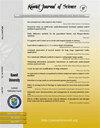罂粟萌发期耐旱、耐盐、耐低温基因型的评价
IF 1.1
4区 综合性期刊
Q3 MULTIDISCIPLINARY SCIENCES
引用次数: 0
摘要
种子萌发是决定幼苗发芽和生长能力的关键阶段。但主要受遗传因素和干旱、盐度、低温等不利环境条件的影响。在不同干旱胁迫(PEG 6000诱导的0、- 2、- 4和- 6 bar)和NaCl盐度(0、5、10、15和20 dS/m)条件下,研究了3个罂粟品种(Çelikoğlu、h本文章由计算机程序翻译,如有差异,请以英文原文为准。
Evaluation of opium poppy genotypes for tolerance to drought, salinity, and low temperatures during the germination stage
Seed germination is a crucial stage in determining the ability of seedlings to emerge and establish. However, it is mainly influenced by genetic factors and unfavorable environmental conditions such as drought, salinity, and low temperatures. In this study, the germination ability of three opium poppy cultivars (Çelikoğlu, Hüseyinbey, and Seyitgazi) and local genotypes (population 4, 6, and 7) was evaluated under various drought stresses (0, −2, −4, and −6 bar induced by PEG 6000) and NaCl salinities (0, 5, 10, 15, and 20 dS/m). Germination percentage, mean germination time, germination index, and germination stress tolerance index were used to assess the response of poppy genotypes to low temperature stress (5, 10, 15, and 20 °C). Emergence performance was also tested under salt and low-temperatures (20 °C and 15 °C). The results showed that increasing salinity led to a decrease in germination percentage and an increase in mean germination time of poppy seeds. Notably, Hüseyinbey had higher and faster germination than the other genotypes. Under drought conditions, no germination was recorded at −6 bar, but Hüseyinbey had the highest germination percentage, germination index, and stress tolerance index at −2 and −4 bar. Pop 4 showed superior germination characteristics at low temperatures. The stress tolerance index and germination index may be useful criteria for selecting plants that can withstand low temperatures. It was determined that poppy genotypes responded differently to abiotic stresses, with Hüseyinbey and Seyitgazi showing resilience to salinity and drought. Moreover, local populations may serve as genetic resources for cold tolerance, given the superior performance of Pop 4 at low temperatures.
求助全文
通过发布文献求助,成功后即可免费获取论文全文。
去求助
来源期刊

Kuwait Journal of Science
MULTIDISCIPLINARY SCIENCES-
CiteScore
1.60
自引率
28.60%
发文量
132
期刊介绍:
Kuwait Journal of Science (KJS) is indexed and abstracted by major publishing houses such as Chemical Abstract, Science Citation Index, Current contents, Mathematics Abstract, Micribiological Abstracts etc. KJS publishes peer-review articles in various fields of Science including Mathematics, Computer Science, Physics, Statistics, Biology, Chemistry and Earth & Environmental Sciences. In addition, it also aims to bring the results of scientific research carried out under a variety of intellectual traditions and organizations to the attention of specialized scholarly readership. As such, the publisher expects the submission of original manuscripts which contain analysis and solutions about important theoretical, empirical and normative issues.
 求助内容:
求助内容: 应助结果提醒方式:
应助结果提醒方式:


